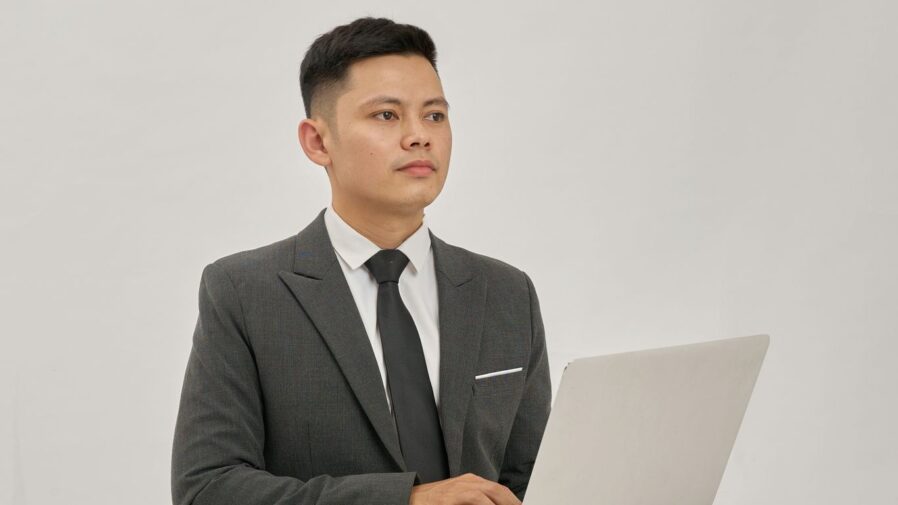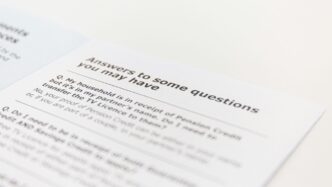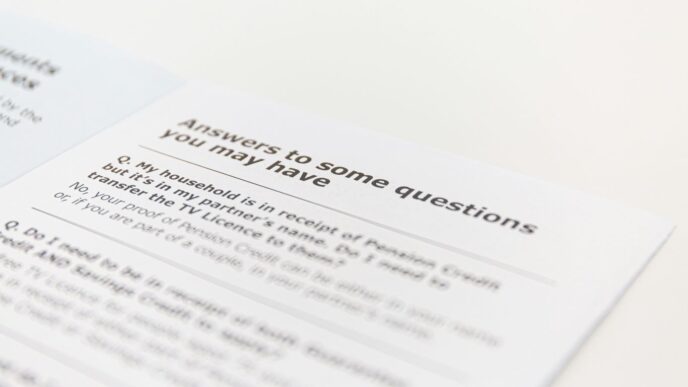Landing your first job is a big deal, and the interview can feel pretty overwhelming. One of the first things you’ll likely be asked is to introduce yourself. It sounds simple, but it’s your chance to make a good impression right off the bat. Think of it as your opening statement, setting the tone for the whole conversation. This guide is all about helping you nail that crucial first impression, especially if you’re just starting out. We’ll cover what interviewers are really looking for when they ask you to talk about yourself, and we’ll give you a solid self-introduction sample for a job interview fresher.
Key Takeaways
- Your self-introduction is your first chance to impress, setting the stage for the interview. It’s more than just stating your name; it’s about showing your personality and suitability for the role.
- A strong introduction for a fresher should cover your academic background, key skills gained through projects or internships, and how these align with the job you’re applying for.
- Practice makes perfect, but avoid sounding overly rehearsed. Authenticity and genuine enthusiasm go a long way in making a memorable impression.
- Pay close attention to your body language, including eye contact and posture. These non-verbal cues communicate confidence and engagement.
- Tailor your introduction to each specific job and company. Researching their values and the role’s requirements shows you’ve done your homework and are genuinely interested.
Understanding the Purpose of Your Self-Introduction

So, you’ve got an interview lined up. Awesome! Before you even get to the tough questions, there’s usually that one opener: "Tell me about yourself." It might seem simple, but it’s actually a pretty big deal. Think of it as your first impression, the handshake of the conversation. It’s not just about stating your name and what you did in college; it’s your chance to set the stage for the entire interview.
Why Interviewers Ask "Tell Me About Yourself"
Interviewers aren’t just being polite when they ask this. They’re trying to get a quick snapshot of who you are, professionally speaking. It helps them see how you present yourself and if you can communicate clearly. They want to know if you can connect your background to what they’re looking for. It’s a way for them to gauge your confidence and see if you’ve done your homework on the role and the company. Basically, they’re looking for a brief, relevant overview that highlights why you’re a good candidate.
Setting the Tone for the Interview
Your opening remarks can really shape the rest of the discussion. A strong, confident introduction can make the interviewer feel more at ease and more interested in what you have to say. Conversely, a hesitant or rambling start can make things awkward for everyone. It’s your opportunity to show you’re prepared and enthusiastic. This initial part of the conversation is where you can start building rapport and showing your personality, making the interview feel more like a chat than an interrogation. It’s a good idea to practice this part so it flows naturally, like you’re just sharing a bit about yourself with a new colleague. You can find some helpful tips on how to approach this at Elevator.
Gauging Confidence and Fit
This is where you show you’re not just qualified on paper, but also comfortable talking about your qualifications. How you speak, your body language, and the content you choose all contribute to this. Are you making eye contact? Are you speaking clearly? Do you seem genuinely interested? These are all things an interviewer picks up on. They’re trying to figure out if you’ll fit into their team and company culture. It’s about more than just skills; it’s about your overall demeanor and how you present yourself as a potential team member. Showing you can handle this initial question well gives them a good sign about how you’ll handle other aspects of the job.
Key Components of a Fresher’s Self-Introduction
So, you’ve got the interview, and now it’s time to talk about yourself. It might seem a bit daunting, especially if this is your first time, but breaking it down makes it much more manageable. Think of it as your personal highlight reel, tailored for the job you’re after.
Formal Greeting and Gratitude
Start off right by being polite. A simple "Good morning/afternoon, and thank you for having me today" goes a long way. It shows you appreciate the opportunity and sets a positive tone. It’s a small thing, but it makes a difference in how you come across from the get-go. Remember to state your name clearly, like Priya Kapoor.
Academic Background and Key Skills
This is where you connect your education to the job. Mention your degree and the university you attended. Don’t just list subjects; think about what you learned that’s relevant. Did you work on specific technologies? Did a particular course teach you a skill that’s useful for this role? For example, if you studied computer science, mentioning your proficiency in languages like Java or Python is smart. Also, think about soft skills you’ve picked up, like being a quick learner or good at problem-solving.
Relevant Projects and Experiences
Even as a fresher, you’ve likely done projects, internships, or volunteer work. These are goldmines for showing what you can do. Instead of just saying you did a project, briefly explain what it was, what your role was, and what you achieved. Did you build a website? Did you help organize an event? Quantify your achievements if you can. For instance, "I helped increase event attendance by 15%" sounds much stronger than just "I helped organize an event."
Career Aspirations and Company Alignment
This part shows you’ve thought about your future and why this specific company is the right place for it. Briefly mention what you hope to achieve in your career and how this role fits into that plan. It’s also a good spot to show you’ve done your homework on the company. Mentioning something specific about their work or values that appeals to you makes your interest seem genuine. It’s about showing you want to grow with them, not just get any job.
Crafting Your “Tell Me About Yourself” Sample
So, you’ve got this question, "Tell me about yourself," and it feels like a big deal, right? It’s your chance to make a first impression that goes beyond your resume. Think of it as a mini-story about your professional journey, tailored for the job you’re interviewing for. The goal isn’t to recount your entire life, but to highlight what makes you a good fit for this specific role and company.
Highlighting Strengths and Adaptability
When you talk about yourself, focus on what you’re good at and how you handle new situations. Instead of just listing skills, give a quick example. For instance, instead of saying "I’m a good problem-solver," you could say, "In my last project, we ran into an unexpected issue with the data, and I was able to figure out a workaround by [briefly explain what you did], which kept the project on track." This shows you can think on your feet. Adaptability is also key for freshers; mention how you quickly learned a new software or adjusted to a different team dynamic. It shows you’re not afraid of change and can grow with the company.
Showcasing Problem-Solving Abilities
Everyone faces challenges, and employers want to know you can handle them. Think about a time you encountered a problem, whether it was in a class project, an internship, or even a volunteer role. What was the situation? What did you do specifically to address it? What was the outcome? Even a small example can demonstrate your thought process. For example, "During a group assignment, one member wasn’t contributing much. I took the initiative to talk to them privately, understand their workload, and then we adjusted our tasks so everyone could contribute effectively. The project was completed on time and with good results." This shows initiative and communication skills.
Connecting Personal Interests to Professionalism
This is where you can add a bit of personality, but keep it relevant. Do you have a hobby that involves strategy, like chess or coding? Or maybe something that requires patience and detail, like gardening or building models? You can briefly mention it and connect it to a professional skill. For example, "Outside of academics, I enjoy playing chess. I find that it’s really helped me develop my strategic thinking and planning skills, which I believe are important for analyzing market trends in this role." It’s a way to show you’re well-rounded and that your interests can actually benefit your work. Just make sure it doesn’t sound forced; keep it natural and brief. Remember, the aim is to give them a glimpse of who you are, professionally speaking, and how your unique background can contribute to their team. You can find more tips on how to approach these kinds of questions on job interview preparation.
Delivering Your Introduction with Impact

So, you’ve got your introduction all planned out, right? That’s great. But honestly, just having the words isn’t enough. How you say them, and how you carry yourself, that’s what really makes people pay attention. Think about it – a lot of what we communicate isn’t even spoken. It’s all in the little things.
The Importance of Body Language
It sounds a bit cliché, but your body really does do a lot of talking before you even get a word out. If you’re slouching or looking at the floor, it doesn’t exactly scream ‘hire me!’ It can make you seem unsure of yourself, or worse, like you’re not really interested in the job. Your nonverbal signals should match what you’re saying. If you’re talking about how excited you are for the role, but you sound bored and don’t make eye contact, that’s a mixed message. It’s like saying you love pizza but then making a face when you eat it. Awkward.
Maintaining Eye Contact and Posture
When you’re talking, try to look the interviewer in the eye. Not in a creepy, staring contest way, but just enough to show you’re engaged and confident. It helps build a connection. And your posture? Sit up straight. It makes you look more alert and professional. Imagine you’re a puppet, and someone’s gently pulling a string from the top of your head – that’s the kind of upright posture you’re aiming for. It’s not about being stiff, just about looking present and ready.
Speaking Clearly and Concisely
Nobody likes listening to someone mumble or ramble on forever. Practice saying your introduction out loud. Maybe even record yourself. You want to speak clearly, at a good pace – not too fast, not too slow. And keep it to the point. You’re giving them a snapshot, not your life story. Think of it like a quick preview of a movie; you want to make them want to see the rest, not give away the whole plot. If you’re unsure about how to start, a simple "Thank you for having me today" is a good way to begin your interview.
Here are a few things to keep in mind:
- Avoid filler words: Try to cut down on ‘um,’ ‘uh,’ and ‘like.’ They can make you sound less prepared.
- Pace yourself: Take a breath before you start speaking. It helps calm nerves and allows you to think.
- Enthusiasm matters: Let your genuine interest in the role show through your voice. A little energy goes a long way.
Common Pitfalls to Avoid in Your Introduction
So, you’ve got your introduction mostly figured out, right? That’s great. But sometimes, even with the best intentions, we can stumble a bit. Let’s talk about what to steer clear of so you make a good impression, not a forgettable one.
Unnecessary or Irrelevant Details
This is a big one. Think about it: the interviewer has limited time, and they want to know about you in relation to this job. Stuff like your favorite color, your pet’s name, or that time you went on a wild vacation last summer? Probably not the best use of precious minutes. Stick to what relates to your skills, your education, and why you’re interested in this particular role. It’s like packing for a trip – you only bring what you need.
Overconfidence and Arrogance
Look, confidence is good. It shows you believe in yourself. But there’s a line between being confident and coming across as a know-it-all. Nobody likes that person. Instead of saying things like, "I’m the best candidate for this job, hands down," try something more like, "I’m really excited about this opportunity because my skills in X and Y align well with what you’re looking for, and I’m eager to learn more."
Appearing Rehearsed or Inauthentic
We all practice our introductions, and that’s smart. But if it sounds like you’re reciting a script from memory, it can feel a bit off. The goal is to sound natural, like you’re having a conversation. Try practicing in front of a mirror, or even record yourself. See if you can make it sound like you’re just talking, not performing. Being genuine is way more important than being perfect.
Here’s a quick rundown of things to watch out for:
- Talking too much: Keep it brief. Aim for about 60 seconds. If you go on too long, people tune out.
- Being too vague: Saying "I’m a hard worker" is okay, but it’s better to say "I’m a hard worker, and in my last project, I stayed late several nights to ensure we met our deadline."
- Sounding negative: Never badmouth previous employers or colleagues. It just makes you look bad.
- Ignoring body language: Slouching or not making eye contact can send the wrong signals, even if your words are good.
Tailoring Your Self-Introduction Sample
So, you’ve got your basic "tell me about yourself" down. That’s a good start, but to really make an impression, you need to tweak it for each specific job. Think of it like this: you wouldn’t wear the same outfit to a wedding and a job interview, right? Same idea here.
Researching Company Culture and Values
Before you even think about what you’ll say, do a little digging. What’s the company all about? Are they super formal, or more laid-back? Do they talk a lot about teamwork, innovation, or customer service on their website? Look at their "About Us" page, their mission statement, and even their social media. Understanding their vibe helps you show them you’re a good fit. If they emphasize collaboration, you might mention a time you worked well in a group. If they’re all about new ideas, talk about a project where you thought outside the box.
Aligning Skills with Job Requirements
Now, look closely at the job description. What are the main things they’re looking for? List out the top 3-5 skills or qualifications they mention. Then, think about your own experiences and skills. Where do they overlap? When you introduce yourself, make sure to highlight those specific skills. For example, if the job needs someone good with data analysis, and you’ve done a lot of that in school projects, mention it. Don’t just say "I’m good with data"; say something like, "In my coursework, I analyzed sales data to identify trends, which I believe aligns with the analytical needs of this role."
Here’s a quick way to map it out:
| Job Requirement | Your Skill/Experience |
|---|---|
| Strong communication | Presented research findings to a class of 50 students. |
| Project management | Led a student club event from planning to execution. |
| Problem-solving | Troubleshot issues with a group coding project. |
Demonstrating Genuine Interest
It’s not just about what you can do; it’s also about why you want to do it here. Mentioning something specific you admire about the company or the role shows you’ve done your homework and aren’t just applying everywhere. Maybe you’re impressed by a recent project they completed, or you’re excited about the opportunity to learn a specific technology they use. This personal touch makes you stand out. It shows you’re not just looking for any job, but you’re looking for this job.
Wrapping It Up: Your First Impression Matters
So, that’s the rundown on making a solid first impression when you’re just starting out. Remember, your self-introduction is your chance to show who you are beyond the paper resume. Keep it short, be genuine, and focus on what makes you a good fit for the job. Practice it a bit, but don’t sound like a robot. Confidence and a positive attitude go a long way. Good luck out there – you’ve got this!
Frequently Asked Questions
What’s the main point of introducing myself?
Interviewers ask you to introduce yourself to see how confident you are and if you’re a good fit for the job. It’s your chance to make a good first impression and show them who you are beyond your resume.
How long should my introduction be?
Keep it short and sweet, about a minute is perfect. Just share the most important things about you that relate to the job, without talking too much or going off-topic.
What should I definitely include in my introduction?
Start with a friendly greeting and thank them for the chance. Then, mention your education, any cool projects or skills you have, and why you’re excited about this specific job. Briefly share what you hope to do in the future, too.
Should I talk about my hobbies?
It’s okay to mention hobbies if they show good qualities like teamwork or creativity, or if they relate to the job. But don’t share anything too personal or unrelated to work.
What body language should I use?
Stand or sit up straight, look at the interviewer when you speak, and smile! Using your hands a little to emphasize points is fine, but don’t overdo it. Good body language shows you’re confident and paying attention.
What are some things to avoid saying?
Don’t talk too much about things that don’t matter for the job. Also, avoid sounding like you know everything or like you’ve practiced your speech too much. Be yourself and show you’re eager to learn.














